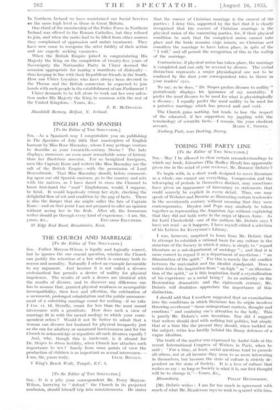THE CHURCH AND MARRIAGE
[To the Editor of THE SPECTATOR.] Sia,—Father Maryon-Wilson is legally and logically correct, but he ignores the one crucial question, whether the Church can justify the retention of a law which is contrary both to reason and morality. Naturally I select an example favourable to my argument. Just because it is not called a divorce ecclesiastical law permits a decree of nullity for physical impotence. The results of such a decree are identical with the results of divorce, and to discover any difference one has to assume that, granted physical weakness or neuropathic incompatibility, then love and affection, the celebration of a sacrament, prolonged cohabitation and the public announce- ment of a subsisting marriage count for nothing—if we take I Cor. vi. 10, literally, count for less than the most casual intercourse with a prostitute. How does such a view of marriage fit in with the sacred analogy to which your corre- spondent refers ? Would it not be better to admit that a woman can divorce her husband for physical incapacity just as she can for adultery or unnatural lasciviousness and for the Church to acknowledge or repudiate all such divorces equally ?
And, why, though this is irrelevant, is it absurd for Dr. Stopes to stress fertility, when Church law attaches such importance to sex ? Surely from some points of view the production of children is as important as sexual intercourse.— I am, Sir, yours truly, CECIL BINNEY.
7 King's Bench Walk, Temple, E.C. 4.


































 Previous page
Previous page